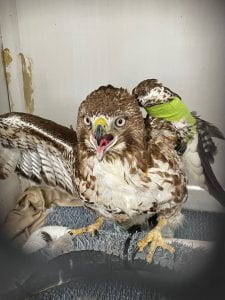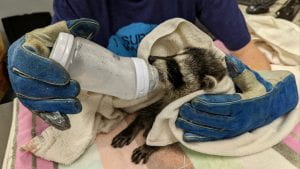Hi! My name is Alex Muller and I’m a rising senior Environmental Studies-Biology major and anthropology minor. This summer I’m interning at Think Wild, a wildlife rehabilitation center in my hometown of Bend, Oregon, where I’ve been working to care for injured and orphaned native wildlife in hopes of re-releasing them back into the wild. I began volunteering with Think Wild last summer and loved it so much I came back to intern this summer. When I started at Whitman I had a very broad idea of what I wanted to do after graduating, but my experience with Think Wild and working in wildlife rehabilitation has certainly helped me focus my interests.
Interning at Think Wild has given me the opportunity to learn more about the natural history of the native species of my hometown while also gaining valuable experience in my areas of academic interest. Working in wildlife rehabilitation certainly combines the environmental, biological, and conservation knowledge I’ve gained while at Whitman in ways I wouldn’t have expected. Every hotline call and every patient we intake requires careful consideration of the species’ natural history and physiology in order to fully understand and assess the situation. We also have species specific protocols put in place by our director of rehabilitation to further help guide us in navigating the specifics of intake assessments and treatment plans.
My day to day internship duties range from helping with intake exams, taking hotline calls, assisting staff with treatments, logging and entering patient data, medicating and feeding animals, and so much more. I’ve also had the unique experience of taking blood from baby birds, tube feeding raptors, and splinting broken wings/limbs on animals of all shapes and sizes. There is never a dull day here and I’m thoroughly enjoying my experience. Below are only a few of the animals I’ve seen come through the hospital since I’ve started.
- Rockchuck with hind limb paralysis
- Fledgling great horned owl entangled in barbed wire
- Golden Eagle with lead poisoning (inspired my thesis research!)
- Orphaned baby skunks, raccoons, squirrels, and chipmunks
- Orphaned nestling house finches, juncos, quail, etc
- Prairie Falcon, Red Tailed Hawk, & other raptors hit by cars
One of the issues we’re facing this year that makes this summer pretty different from past years is the highly pathogenic avian influenza (HPAI). HPAI is extremely contagious and oftentimes fatal and would be detrimental if it entered our facility. Waterfowl (ducks, geese, etc) are entirely asymptomatic for it but are capable of carrying it, so the Oregon Department of Fish and Wildlife (ODFW) has banned the rehabilitation of waterfowl in Oregon. We currently aren’t accepting any waterfowl patients due to this ban, which drastically changes our patient demographic. We would typically have a full enclosure of ducks and geese throughout the entire summer, so it’s been quite an adjustment. This doesn’t stop people from calling though. Our hotline still gets calls regarding injured or orphaned waterfowl and all we can do is explain to the public what HPAI is and that we legally cannot take waterfowl in right now. The local news actually came in towards the beginning of my internship and interviewed Think Wild for a story on HPAI in Oregon, which included a brief interview with me! I’ll link that story below along with some photos from my internship so far. I have plenty of photos of the various creatures but can’t include them all, so just a few will have to do!
https://centraloregondaily.com/think-wild-avian-influenza-oregon-water-fowl-rehab-ban
Experiences like Alex Muller’s are made possible by the Whitman Internship Grant, which provides funding for students to participate in unpaid internships at nonprofit, some for-profit, and government organizations. We are happy to be sharing blog posts from students who were supported by either a summer, fall, spring, or year-long grants at organizations, businesses, and research labs all around the world. To learn how you could secure a Whitman Internship Grant or host a Whitman intern at your organization, contact us at ccec_info@whitman.edu.


